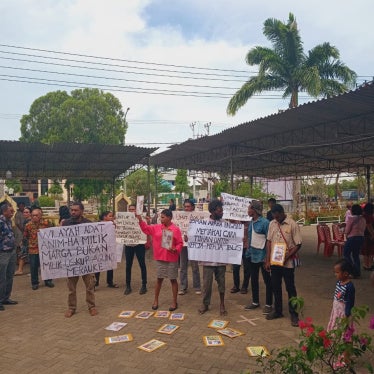(New York, December 2, 2003) — The Nigerian government has been responsible for killings, torture, and harassment of its critics over the last two years, Human Rights Watch charged in a report released today.
The 40-page report, “Nigeria: Renewed Crackdown on Freedom of Expression,” documents killings, arrest, detention, ill-treatment, torture and other forms of harassment and intimidation of real or perceived critics of the government over the past two years. Most of these abuses have been carried out by the Nigerian police or by members of the intelligence services known as the State Security Service (SSS).
“Commonwealth leaders meeting in Abuja should not give Nigeria a free pass on human rights,” said Peter Takirambudde, executive director of the Africa Division of Human Rights Watch. “Even though military rule has ended, Nigerians still cannot express themselves freely without fear of grave consequences.”
Brutal measures have been used to repress critical expression. In the most serious cases, people have been shot dead simply for exercising their right to protest. During massive public protests in July at an increase in the price of fuel, between 12 and 20 people were shot dead by the police in Lagos, in the oil city of Port Harcourt, and on the outskirts of Abuja. The victims included peaceful protestors and passersby who were not even involved in the protests.
The report also contains the testimonies of individuals who were among a group of around 30 people arrested after staging a peaceful protest outside the U.S. embassy in Abuja against U.S. President George W. Bush´s visit to Nigeria in July. They were detained for two weeks and several were tortured on direct instructions from the highest levels of the police force.
“President Obasanjo´s promises of democracy mean little as long as people are being detained, tortured and shot simply for expressing views critical of the government,” said Takirambudde. “No one has been brought to justice for these acts.”
The Human Rights Watch report also describes the harassment of opposition party supporters and other political activists since the April and May elections, in which President Obasanjo and his ruling People´s Democratic Party won a comfortable victory. The elections themselves were marred by political violence, especially in the south and southeast of the country, and by widespread fraud and ballot-rigging. The government and the security forces have since tried to prevent political rallies from taking place. Members of organizations agitating for autonomy for the Yoruba or Igbo ethnic groups have been arrested and detained unlawfully.
Human rights activists and journalists have borne the brunt of the government’s crackdown, including harassment by the police and attempts at censorship on several occasions in the past two years. Several journalists have been physically assaulted. Most recently, on November 21, Psaro Yornamue, a journalist in charge of the Rivers State office of the Daily Independent newspaper, on his way to his office was beaten and threatened in connection with an article he had written alleging corruption by the state’s deputy governor. On November 24, three journalists at Insider magazine were arrested by the police in Lagos, detained for two days and charged with sedition and defamation of character, in connection with an article alleging that the Vice-President and the National Security Adviser to the President were involved in large-scale theft of crude oil.
Since completing research on the report, Human Rights Watch has been informed of further worrying incidents. In November, police disrupted public processions organized by activists of the Ogoni ethnic group to commemorate the execution of Ogoni leader Ken Saro-Wiwa and eight other activists in 1995. On November 10 in the southern oil port of Bonny, police arrested 17 Ogoni activists, several of whom stated that they were beaten by the police. The activists, who were released the following day, face charges of unlawful procession and conduct likely to cause a breach of the peace. Police also arrested more than 20 Ogoni activists in a suburb of Port Harcourt on November 14, on the grounds that they had taken part in a commemorative vigil on November 9. Leaders of the Movement for the Survival of the Ogoni People (MOSOP) have also received personal death threats in recent weeks.
The Commonwealth Heads of Government Meeting is scheduled to take place in Abuja from December 5-8.
“Foreign governments remained virtually silent about election violence in Nigeria, yet abuses during the Zimbabwe elections provoked widespread condemnation,” said Takirambudde. “Unless the Commonwealth addresses abuses in all of its member countries and denounces them accordingly, it will stand accused of maintaining double standards and its credibility will be undermined. There is no excuse for Commonwealth leaders to turn a blind eye to human rights abuses in the very country where they are meeting.”
Human Rights Watch has also written to President Obasanjo setting out recommendations on human rights for the Commonwealth Heads of Government Meeting and urging him to hand over former Liberian president Charles Taylor to the Sierra Leone Special Court.





